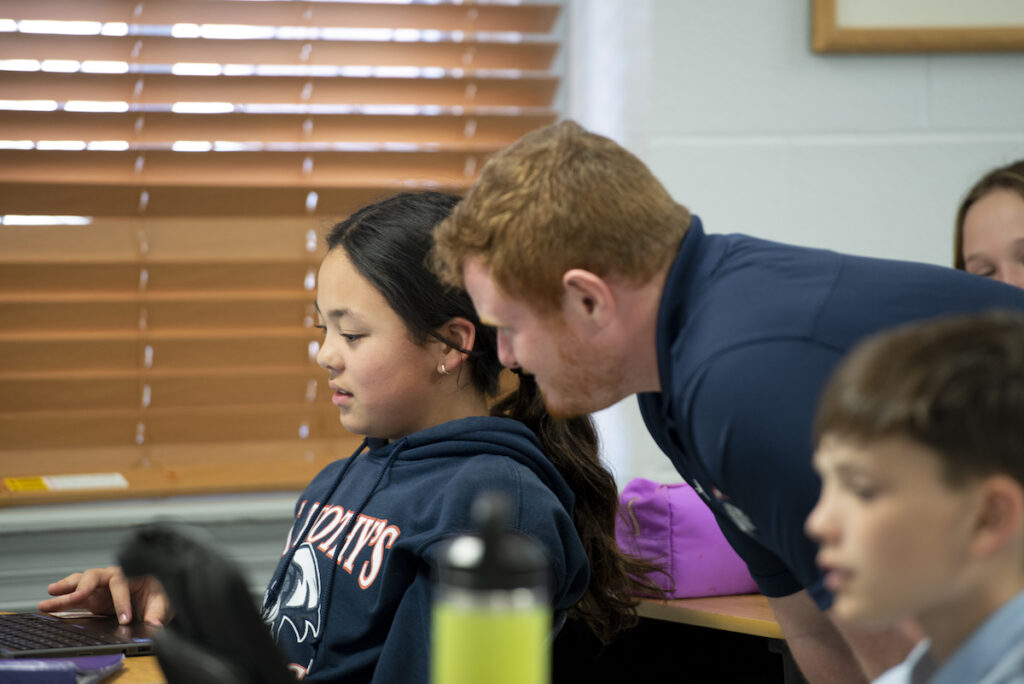Self-advocacy is a valuable life skill that children develop throughout their time as students. From asking their teachers for extra help to choosing books to read at the library, self-advocacy can take many forms as young students learn to be independent.
As a parent, it’s essential to encourage your child to self-advocate inside and outside the classroom. At St. Timothy’s School, we promote self-advocacy throughout all grade levels by laying the groundwork for academic, intellectual, and spiritual foundations. From our youngest learners to our middle schoolers, our students develop self-advocacy through everyday moments of integrity, service, and purpose. Below, we’ve compiled a list of ways to encourage your child to self-advocate.
Encourage Self Awareness
Self-advocacy and self-awareness go hand in hand when developing strong communication skills. For young learners, the first step to becoming more self-aware is understanding their feelings and needs. Whether they feel nervous raising their hand in class or making friends at recess, your child must first identify their feelings to advocate for themselves inside and outside the classroom.
As a parent, there are several ways you can encourage self-awareness in your child. Consider sitting down with your child to help map out their strengths and needs. Then, help them identify areas where they can practice self-advocacy. For a more fun approach, consider encouraging self-awareness through television or movie characters. While engaging in these forms of entertainment, children can connect their feelings by identifying the characters’ emotions in stories, showing them what they may be feeling and how they can take action to better themselves.
Provide Language to Use
For preschoolers and early lower school students, vocabulary may be something to focus on when learning self-advocacy. At an early age, children may not know the exact words to use when asking a question or stating their needs. As a parent, you can demonstrate ways to express your feelings and needs at home, providing your child with examples of effective communication. For example, when eating at the dinner table, you may teach your child how to politely ask for a dish. Instead of gesturing toward the dish and asking, “Can I have that?” you can say, “Can you please pass the gravy? I need it for my potatoes .” Showcasing etiquette and clarity, these mindful questions show your child how to communicate their needs politely.
Provide Real-World Opportunities
It’s one thing to speak up at the dinner table; it’s another thing to express yourself in the real world. Providing your child with opportunities to self-advocate outside of the house is crucial. You might encourage them to order their food while dining at restaurants. In this case, you could suggest polite ways to modify orders or special requests, such as “May I please have some more ketchup?”. Doing so will make your child more comfortable communicating their needs in new environments.
Let Children Do Things on Their Own
As a parent, it’s easy to instinctively jump to your child’s side when they ask for help. However, sometimes it’s best to let them figure out things independently. This way, your child can become more self-assured and confident in their own abilities, allowing them to become a better self-advocate in the process. For example, your child might ask you to pour a glass of water for them before bed, even when they are capable of pouring it themselves. In this case, place the water pitcher on a shelf within their reach, and encourage them to pour a glass on their own. Then, while they pour, you can stand close in case they need help. By doing so, your child can become self-efficient and independent.
Encourage Reading
Reading is an excellent way to show children examples of self-advocacy. Many children’s books center around solid character development, following a protagonist who learns to stick up for themselves by the end of the story. For example, Junie B Jones, a popular first-grade level book series, follows the life of a strong-willed first grader who comes into her own. Reading a story like this may encourage your child to develop social-emotional skills and discover ways to self-advocate more effectively.
Private Education at St. Timothy’s School
As a top private school in Raleigh, NC, St. Timothy’s School is a private school in Raleigh, NC, encourages young learners to self-advocate inside and outside the classroom. With a comprehensive curriculum built on independence, creativity, problem-solving, and more, we help our students develop lifelong communication skills. Visit our website today to learn more.

